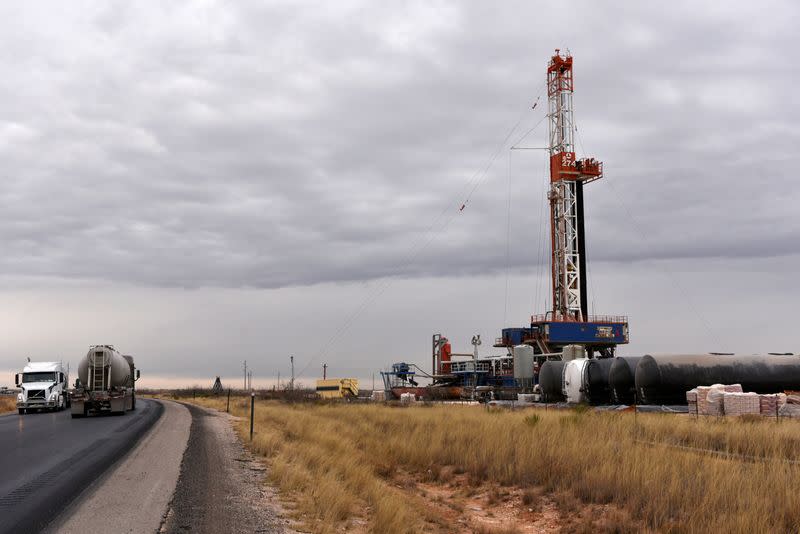Analysis-A mountain of asset sales loom after oil megamerger era
By Shariq Khan, Sabrina Valle and Arathy Somasekhar
(Reuters) - U.S. oil and gas companies could face an uphill struggle to sell about $27 billion of assets to fund investor payouts over the next few years as the biggest wave of energy megamergers in 25 years nears the end of regulatory reviews.
The share buybacks and dividends are needed to lure investors back to an industry that many have shunned over volatile returns and pressure to decarbonize portfolios. Energy stocks represent just 4.1% by weight of the S&P 500, a third of their 2011 share as tech and health care investments took off.
But finding new owners for these properties is unlikely to be quick or easy, bankers and analysts warn. There are fewer institutional and European oil buyers interested, and a lack of ready cash to finance these deals. The private equity firms that once bought Big Oil's cast-offs have turned to energy transition, social impact and renewable investments.
The scale of mergers has been unprecedented with $180 billion from six deals since October. Driven by a rush to add oil reserves that can be tapped in the future, most of these deals are expected to wrap up this year and will unleash a burst of oil wells, pipelines, offshore fields and infrastructure packages onto the market. The lack of ready buyers suggests sales will take time and may turn into asset swaps, rather than cash sales.
Three acquirers - Chevron, ConocoPhillips and Occidental Petroleum - have pledged to raise between $16 billion and $23 billion combined from post-closing sales. Exxon Mobil, the top dealmaker, has not disclosed a divestiture target. But it has raised $4 billion per year in sale proceeds since 2021.
In addition to fewer private-equity and international buyers, more intensive regulatory reviews have slowed the marketing kickoff. Some investment bankers believe the divestitures could run well into next year.
HITTING THE MARKET
Exxon, which purchased Pioneer Natural Resources for $60 billion in May, wants to sell a collection of conventional oil and gas properties across the Permian Basin, to focus on higher growth assets, a spokesperson confirmed.
Conoco is primed to sell Western Oklahoma gas properties picked up in its $22.5 billion deal for Marathon Oil, and Chevron likely will place some of Hess' Asia offshore assets alongside its Canadian and U.S. gas packages now on the block, people familiar with the matter said on condition of anonymity because regulatory reviews are underway.
Occidental has readied a sale of West Texas shale assets that could fetch $1 billion, and could add offshore Gulf of Mexico and Middle East assets once its CrownRock acquisition closes, say analysts.
Exxon confirmed it is exploring a sale of select conventional oil assets in West Texas and New Mexico "consistent with our strategy to continually evaluate our portfolio." It has not set a new asset sale target since the Pioneer deal.
Conoco and Occidental declined to comment on their asset sales targets.
A Chevron spokesperson said after the Hess closing "we're going to add some assets that are going to be highly attractive" to other companies. It could generate $10 billion to $15 billion in pre-tax proceeds through 2028.
HURDLES REMAIN
"These are not the best assets in the industry," said Luis Rhi, a portfolio manager at asset management firm Barrow Hanley Global Investors, who believes the companies can afford to sit pat until the market for assets improves.
"There is a real disconnect between the assets available and the dollars raised to buy those assets," David Krieger, co-managing partner at Houston energy investment firm Covalence Investment Partners. "Dry powder for oil and gas investing is a fraction of what it used to be," he said.
Europe's oil majors, burned by past forays into U.S. shale, are not apt to return, said Brian Williams, managing director at investment bank Carl Marks Advisors. They "have completed their education" and have largely exited U.S. shale, he said.
Smaller private-equity backed firms lack the capital for these deals, say energy advisers. In 2023, just 78% of announced oil deals were below $1 billion in cost, compared to 94% in 2019, according to M&A advisory firm Petrie Partners.
"There are not a lot of sub-$1 billion acquisitions happening," said Todd Dittmann, who has invested in energy for several decades, mostly recently for Angelo Gordon & Co.
"There is an exit problem in energy private equity and partners are not happy about it," he said.
WHO'S LEFT?
Closely-held oil companies including Hilcorp, which specializes in buying mature fields, smaller publicly traded oil producers, and Asian and Middle East investors are best positioned. Japanese companies recently have shown more interest in U.S. natural gas, say bankers.
Hilcorp, founded by billionaire Jeffery Hildebrand, "is chomping at the bit" to get a look at Big Oil's cast-offs, said a person familiar with the company.
Elsewhere, "We continue to see interest from parts of the globe outside Europe -- Asia, Middle East and other areas -- where there is appetite to be involved and deploy capital," said Bruce On, a partner in Ernst & Young's strategy and transactions group.
Many properties in the top U.S. shale field will be traded away or kept for their cash flow, said Andrew Dittmar, director of M&A at energy analytics firm Enverus.
"There is going to be a lot of ammunition for swaps and trades" in West Texas and New Mexico, he said.
(Reporting by Shariq Khan, Sabrina Valle, and Arathy Somasekhar; additional reporting and writing by Gary McWilliams; Editing by Anna Driver)

 Yahoo Finance
Yahoo Finance 

